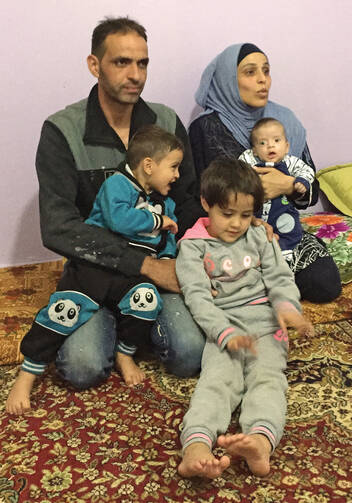A young Syrian couple and their three young children, including a 2-month-old baby suffering from hydrocephalus and spina-bifida, are among 101 vulnerable refugees scheduled to take an Alitalia plane from Beirut to Rome in the early morning hours of May 3 to begin a new life in Italy.
Mouhammad Amin El Oujali, 35, and his wife Zafira El Aquad, 34, managed to join the group at the very last moment thanks to the insistence of Zafira, who pleaded for her baby son, Layah, who needs immediate surgery. He will now get this treatment in Turin, Italy, a few days after this Sunni Muslim family from Homs arrives.
Zafira and Mouhammad’s family are among the 38 lucky families who will board the flight to Rome. Thirty-eight of the 101 refugees are Christian, and 30 percent are under the age of 12. They are able to take this safe route to freedom instead of risking their lives in a boat crossing the Mediterranean thanks to the Humanitarian Corridors project organized by the Sant’Egidio Community, a Catholic lay organization; the Federation of Protestant Churches; and the Waldensian Table in Italy, with the cooperation of the Italian government. The project, the first of its kind in Europe, has begun at a time when several European countries are closing their doors to refugees from Syria, Iraq, Libya and elsewhere in Africa and Asia.
Conceived as an ecumenical response to the biggest humanitarian crisis Europe has experienced since the end of the Second World War, it has three main objectives: to ensure that refugees avoid having to risk their lives crossing the Mediterranean; to prevent refugees from being exploited by human traffickers; and to enable refugees in vulnerable situations to gain entry into Italy with a humanitarian visa.
The story of Mouhammad and Zafira is emblematic of the refugee experience. Until 2012, they had lived in the city of Homs in western Syria. Mouhammad worked as a plumber; Zafira was a clothes designer. They were not rich, but they had a comfortable life.
“We never thought of leaving our home, we were happy,” she said. Their tranquil life was shattered when the civil war broke out. The people of Homs were caught in the cross-fire. Zafira and her family were afraid to go out even to get water. Then Shiite fighters carried out a massacre, killing 38 people, including a pregnant woman whose body they cut open with a knife, tearing out the fetus, Zafira said.
Many people they knew were arrested and never seen again. They and their neighbors were terrified. One day many decided to abandon their homes and flee the city that had become like hell.
Zafira was five months pregnant when they left home. Her husband was reluctant to leave, but she convinced him, saying: “If we stay we die; if we travel, we risk death. So it’s better to travel.”
Zafira is a very strong character, full of hope. She spoke of her happiness at being able to go to Italy. Her family’s situation had become unsustainable in Lebanon, she said. Their documents had expired; they had no money. She and her husband could not get work.
She had sold her gold bracelets to get into Lebanon; she had nothing else to sell. “If nobody had helped me, then I would have tried taking a boat to Europe,” she added.
Now she dreams of better things. “I hope that there I can cure my child, and my children can go to school and my husband find a job,” she said. She never wants to return to Syria, where she has seen such horrors. “We have nothing there,” Zafira says. “We have lost everything.”








